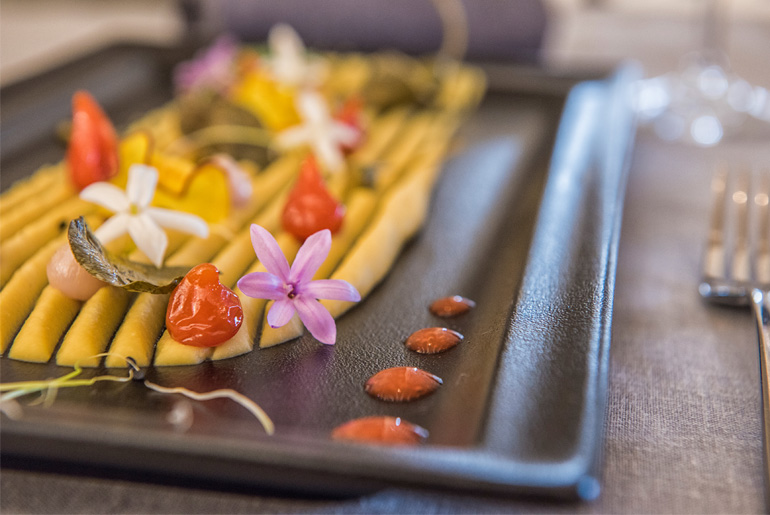The best food in Santorini is traditional and relies on ingredients produced on the island through farming and fishing.
As much as it is known for sunsets that take your breath away, for Oia’s whitewashed houses suspended above the caldera, for paradise-island beaches, and for being the site of one of the world’s most destructive volcanic eruptions, Santorini is also known for food and wine.
This complex of Cycladic islands is now a popular tourist destination, but this development is rather recent. Until the 1960s, the island didn’t even have electricity. The locals used traditional means to prepare food, and because of the volcanic nature of the island, gardening was challenging too, as not many of the conventional vegetables found elsewhere can grow here.
Santorini is famous for its tomatoes, or “tomatinia,” the fruits with the wealthiest lycopene content in the known world. Lycopene is a cancer-preventative phytonutrient, rich in antioxidants, great for supporting cardiovascular health, reducing the risk of heart disease. It has numerous other benefits for your health, as Dr. Axe reveals in this article.
Besides growing its famouslittle tomatoes, Santorini farmers also cultivate white eggplants, “katsouni” cucumbers, small zucchini, and yellow split peas (used to prepare fava). These are the essential vegetable ingredients used to make the best food in Santorini. Here are some of the must-try dishes when you visit the island.
- Apochti: is cured pork loin. The blade end of the loin is salted and marinated in vinegar for two-three days before it’s seasoned with pepper, cinnamon, and spices and dried in the sun. It is very similar to the louza found on other islands of the Cyclades. Apochti, which is cured almost like the Cretan apaki, is a has Byzantine roots, as the name “apochti” demonstrates (the Byzantine term for this gourmet delicacy is apoktin).
- Chlorotyri: is a Santorini local cheese, usually made of goat’s milk, although sheep’s milk can be used too. Because farmers produce it in small batches, it is not easy to find, although most gourmet restaurants should have it.
- Capers: another edible plant that grows in abundance on Santorini. The caper bush, also known as Flinders rose, produces edible flower buds – the capers – which are pickled and used in salads, to add taste to stews and other meat-based dishes, to spice-up fava, and so on.
- Kouneli tyravgoulo is rabbit stew with eggs and cheese. If you like rabbit, you will find this dish very interesting. According to the Greek Gastronomy Guide, rabbit meat is fried in olive oil with onion, garlic, and flour, then seasoned with salt to taste and braised with bay leaves in wine and water. The stew is then thickened with eggs and grated kefalotyri cheese.
- Ntomatokeftedes: basically, tomato fritters made with tomatines. This is one of Santorini’s signature dishes, present on all menus all over the island. The tomatoes are grated and mixed with finely chopped spring onions, Santorini herbs like oregano, thyme, and mint, seasoned with salt and pepper to taste. A full recipe is available here.
- Santorini salad: a delight of the summer, it contains barley rusks, capers and caper leaves, tomatoes, and Chlorotyri.
- Sfoungato: the perfect start for the day, this is an omelette with zucchini, tomatoes, and potatoes fried in olive oil.
- Skordomakarona: pasta with browned garlic, a favourite of the working class, according to the Greek Gastronomy Guide.
- Psarolia psita: sun-dried small white fish usually consumed as meze for wine. Fish lovers will also enjoy Xelouistos cod which is consumed uncooked, mixed in a tomato salad.
- Poulia yemista: zucchini blossoms stuffed with rice, grated zucchini, tomatoes, mint, parsley, and spices.
- Fava: just like Ntomatokeftedes, this is one of the best foods of Santorini. It’s a dish made with yellow split peas which are boiled and pureed. It is served warm with a drizzle of olive oil and topped with capers and scallions. It’s quite tasty cold too.
These are just some of the traditional must-try dishes. You can find most of them in traditional taverns all over the island. Of course, our menu at Alios Illios restaurant will reward you.




